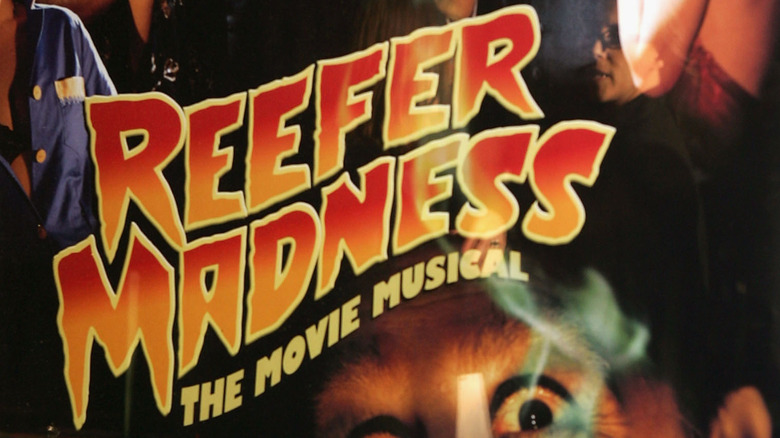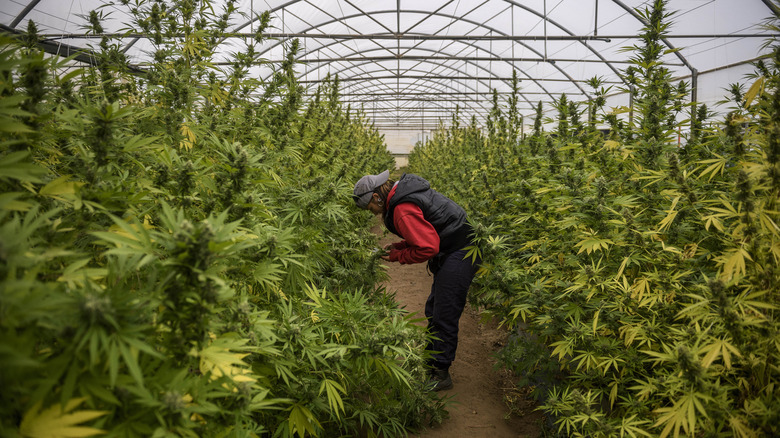The History Of The Slang Terms For Cannabis Explained
Humans have been using the cannabis plant to alter their state of consciousness for at least 2,500 years, according to National Geographic. Governments haven't always been on board with that, however, and indeed, as of this writing it remains illegal in the United States as a matter of federal law, even as states have been legalizing the plant for recreational and/or medical use in recent years.
Over the past century or so, a thriving cannabis subculture has arisen, and within that culture, a variety of slang terms have popped up to describe the mind-altering plant. Some of those names are borrowed from other languages, some reference the fact that cannabis is a plant, and at least one name of the plant was deliberately used to stir up hysteria against it. Other slang terms have just sort of came about organically or have comedic origins. At the end of the day, however, it's pretty much impossible to use a slang term for cannabis without someone within earshot recognizing what you're talking about. Following is a non-exhaustive explanation how a few of the more-used slang terms came to be.
Reefer madness
For a time in the United States, the government was extremely zealous about keeping cannabis out of the hands of Americans, as were certain elements who believed themselves to be the guardians of America's moral fabric. And while legislation works to a point, it never hurts to appeal to propaganda and hysteria, either.
That's why the so-bad-it's-good 1936 anti-cannabis propaganda film "Reefer Madness" is a chapter in the history of cannabis culture, for good or for ill, as KQED notes. Using "reefer" to, uh, refer to cannabis hasn't really been a thing since the 1970s, but the term was big for decades. According to Time, the word started out as "grifo," a Mexican slang word that initially referred to someone with messy and tangled hair, then came to mean someone under the influence of cannabis, while it became "reefer" in the U.S.
On the subject of propaganda and hysteria, the word "marijuana" also has its roots in anti-cannabis sentiment, as The Guardian reports. Specifically, it's a Spanish-language term for the substance, and the U.S. government hoped that by using a foreign word, it would help stir anti-cannabis sentiment. "There are 100,000 total marijuana smokers in the US, and most are Negroes, Hispanics, Filipinos, and entertainers," Henry Anslinger, the politician who spearheaded marijuana prohibition, famously said of the plant.
Plant-based slang
As far as producing drugs goes, it's hard to beat cannabis. Drop a seed in the ground, give it the bare minimum of care, and you're almost certain to come out with some smokeable plant matter a few weeks or months later, although your results may vary when it comes to potency.
The fact that cannabis is a plant that grows in the ground has led to a variety of nicknames for it. Some of those include "grass," although it's not technically a grass like bamboo or maize; "herb" which fits, because botanically cannabis truly is an herb, according to Britannica, although you probably don't want to season your food with it; "weed" — because, like weeds, cannabis is comically easy to grow; and "bud" or "kind bud," because the buds of the plant are where the more potent THC-producing parts are according to Time.
Speaking of those buds, the word "ganja," though slang in the United States (and other English-speaking countries), was and is a real word. Specifically, according to Ganjapreneur, it came from a Sanskrit word that referred to the flower of the cannabis plant.
Just for fun -- sticky icky
A third category of slang terms for the cannabis plant is the group of words of comedic origin; they simply sound funny, they're plays on other words, or they comically refer to someone under the influence of cannabis. For example, as Time notes, "doobie" was at one time a term to refer to a stupid person, so it would make sense that the term would be applied to cannabis since sometimes people under its influence act silly.
"Sticky Icky," according to Ganjapreneur, refers to the fact that good cannabis smells terrible and produces an oily goo that sticks to your fingers. On the subject of smell, "skunk" is also a term to refer to high-quality cannabis, according to Merry Jane, due to the similarity in smells between the cannabis plant and a skunk.
The same website also notes that the phrase "Mary Jane" is simply a play on the Spanish word "Marijuana," which itself looks visually like a portmanteau of two Spanish-language women's names. Finally, as The Independent notes, the term "chronic" to refer to high-quality cannabis came from none other than famed pot enthusiast Snoop Dogg, who one day stumbled over his own tongue while trying to pronounce "hydroponic," and a new slang term was born.
'Pot' was a drink (probably)
Other than the word "marijuana," which many cannabis advocates would like to see retired due to its origins in racism (per The Guardian), perhaps no other slang term for cannabis is as associated with the plant as the word "pot." As it turns out, the word does not refer to the pot in which you grow the plant, and indeed, its origins aren't even in English.
Rather, as Dictionary.com notes, the word from which we get "pot" probably — although there's no saying for certain — comes from the Spanish word "potiguaya" or, alternately, "potaguaya," which itself came from "potación de guaya," or "drink of grief." That concoction was made of brandy or wine that had been steeped with cannabis buds, and the word made its way to Mexico, and then into English, where it was shortened to "pot" and became associated with cannabis itself, rather than the drink. One theory, via Weedmaps, is that the word's usage can be traced to author Chester Himes, who wrote a 1938 short story in which a man smokes "pot" and gets high.




